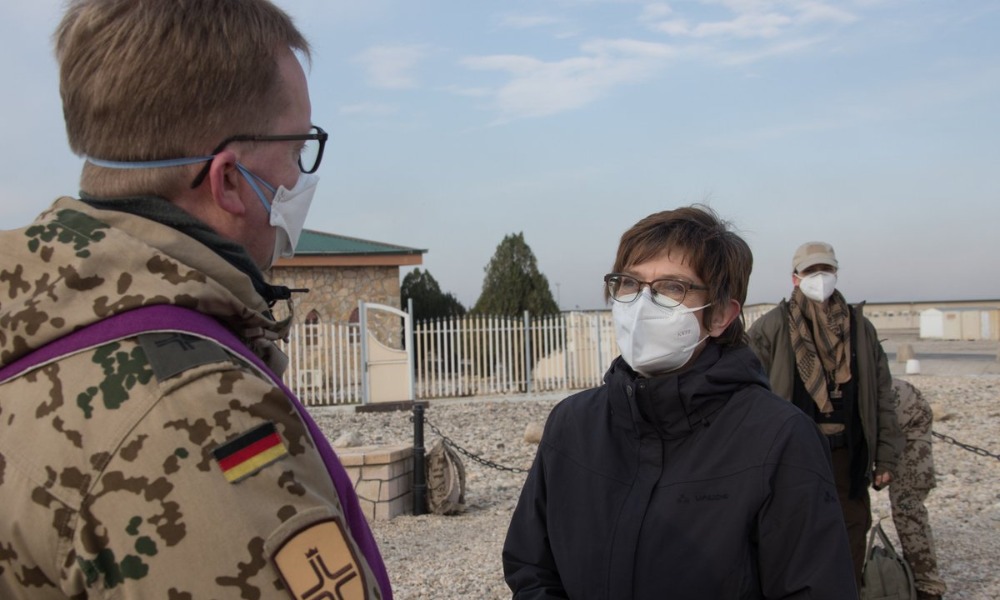Latest News
German Defense Minister not ruling out more troops to Afghanistan

German Defense Minister Annegret Kramp-Karrenbauer said if the security situation worsens drastically in Afghanistan, Germany would not rule out sending in more troops if necessary.
Speaking to Deutsche Welle, she said should the situation deteriorate “we would have to talk about a completely new mandate.”
She told DW however that the current mandate ceiling of 1,300 soldiers should be sufficient for the next few months.
The German defense minister arrived in Afghanistan early Friday morning for an unannounced visit to Mazar-e-Sharif, the capital of Balkh province, where the majority of German troops are stationed.
Her visit comes after the German government on Wednesday agreed to extend its military mandate in Afghanistan by at least another 10 months.
Germany’s Deutsche Welle reported that the new draft mandate still needs the approval of the Bundestag, the lower house of parliament.
The current mandate is set to expire at the end of March.
Under the draft agreed by Chancellor Angela Merkel’s Cabinet, German troops would be able to stay in the country until January 31, 2022, Deutsche Welle reported.
During her visit, Kramp-Karrenbauer stated that Afghanistan “urgently needs a settlement between the opposing groups of its society.”
She said German soldiers cannot replace these reconciliation processes, but they were “making an important contribution together with allies, especially in the north of the country,” she said.
“We stand ready to continue to support the peace process. The protection of our soldiers has a very high priority in view of the security situation, and all necessary measures are taken together with our partners,” Kramp-Karrenbauer added.
Kramp-Karrenbauer stated that Berlin’s goal remained an orderly withdrawal of troops from Afghanistan.
NATO Secretary-General Jens Stoltenberg said last week that no final decision had been made on the future of foreign troops in Afghanistan – despite the May 1 troop withdrawal deadline.
Stoltenberg acknowledged that the military alliance is facing “many dilemmas” over its continued engagement in the country.
With over 1,100 troops, Germany has the second-largest contingent after the United States in the NATO’s Resolute Support mission in Afghanistan.
Latest News
Girls’ education is a ‘vital issue’ for Afghanistan: Karzai

Former president Hamid Karzai said in a meeting with Iran’s ambassador and special representative, Hassan Kazemi Qomi, that education of girls was a “vital issue” for Afghanistan.
Karzai said he appreciated Iran’s cooperation and its standing with the Afghan people, especially Iran’s contributions to education in Afghanistan.
During the meeting, Karzai said peace and stability in the region are in the interest of all regional countries.
Latest News
Uzbekistan’s humanitarian aid arrives in Balkh

A shipment of humanitarian aid from Uzbekistan was handed over on Thursday to the local officials of Balkh province in the trade port of Hairatan.
Local authorities said the aid, which includes flour, oil, wheat, sugar and meat, has been handed over by Uzbekistan’s Surkhandarya governor to the governor of Balkh.
The governor of Surkhandarya stated the purpose of sending this aid was to support the people of Afghanistan and stressed the need for the development of good relations between the two countries.
Latest News
Afghanistan’s problems caused more damage to Pakistan than 3 wars with India: Durrani

Islamabad’s special envoy for Afghanistan Asif Durrani said on Wednesday that Pakistan has suffered more due to Afghanistan’s internal situation than Pakistan has suffered in three wars with India in terms of blood spilt and finances drained.
Durrani said at a one-day International Conference titled “Pakistan in the Emerging Geopolitical Landscape”, which was organized by the Institute of Strategic Studies Islamabad (ISSI) and the German Friedrich Ebert Stiftung (FES), that over 80,000 Pakistanis died in the two decades of the War on Terror and that his country was still counting its dead and injured.
“After the withdrawal of NATO forces, it was hoped that peace in Afghanistan would bring peace to the region. However, such expectations were short-lived,” he said.
He also stated that attacks by the Tehreek-e-Taliban Pakistan (TTP) militant group on Pakistan’s border areas increased by 65 percent, while suicide attacks increased by 500 percent.
“The TTP’s enhanced attacks on Pakistan while using Afghan soil have been a serious concern for Pakistan. Another worrying aspect is the participation of Afghan nationals in these attacks,” he said.
Durrani also said Pakistan had suffered geopolitically since the Soviet Union invaded the neighboring country.
“The post-9/11 world order has negatively impacted Pakistan. Apart from losing 80,000 citizens’ lives, including 8,000 law enforcement agency personnel, the country’s economic opportunity cost is estimated at $150 billion,” Durrani said.
Talking about the future outlook for Pakistan in the regional context, Durrani said that while “our eastern neighbor is likely to continue with its anti-Pakistan pursuits, the western border poses an avoidable irritant in the short to medium term.”
However, he said Pakistan can overcome its difficulties with Afghanistan, including the TTP challenge.
-

 Latest News4 days ago
Latest News4 days agoPakistan’s frontiers minister stresses ‘dignified’ return of Afghan refugees
-

 Regional3 days ago
Regional3 days agoIranian president lands in Pakistan for three-day visit to mend ties
-

 Latest News2 days ago
Latest News2 days agoRashid Khan named AWCC’s brand ambassador
-

 Climate Change4 days ago
Climate Change4 days agoMassive river flooding expected in China, threatening millions
-

 Latest News5 days ago
Latest News5 days agoChinese keen to invest in Panjshir-Kabul water conduit project
-

 World4 days ago
World4 days agoTwo Japan navy helicopters crash, one body found, 7 missing
-

 Sport4 days ago
Sport4 days agoACL: Aino Mina 3-0 Istiqlal Kabul; Attack Energy 3-0 Khadim
-

 Sport3 days ago
Sport3 days agoKolkata beat Bengaluru by one run in IPL as Kohli fumes at dismissal
























